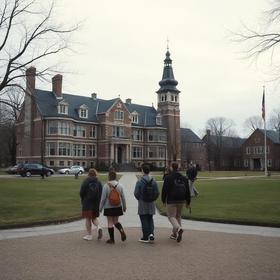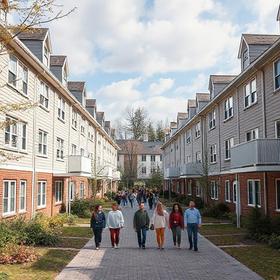5 Reasons to Choose a Boys' School
Single-sex education has a long and distinctive history in the annals of Western education.
It also has its dark side when you consider that only children of the upper classes were taught how to read and write. When the founders of this country began to grapple with the realities of building and advancing a nation built on democratic principles, they soon realized that education was one of the keys to future success.
The Phillips family, for example, invested substantial amounts of money to establish the now famous schools - Andover and Exeter - which bear their name. Many other visionaries did the same thing or followed their example, as you can see from this list of schools established in the 1700s. Those first schools were single-sex schools. Boys' schools. Girls didn't matter back then, apparently.
.jpg)
This vision statement from Woodberry Forest School in Woodberry Forest, Virginia, states the argument succinctly:
"Since the school’s founding in 1889, Woodberry Forest has sought to develop young men of intellectual thoroughness and principled integrity equipped with the capacity and eagerness to serve as leaders, learners, and citizens. Consistent with the historical founding of the school on Christian principles, we aspire to instill in every boy a deep sense of empathy, an enduring self-confidence buttressed by genuine humility, and an enthusiastic pursuit of lifelong learning marked by curiosity and adaptability. Above all, we aim for every boy to enjoy a meaningful life by nurturing his commitment to act upon moral beliefs and ethical values in service to others."
So why should you consider a boys' school for your son in the 21st century?
1. Boys learn differently from girls.
There is now a recognized body of research that posits that boys do learn differently from girls.
- Boys and Girls Learn Differently! by Michael Gurian explains this line of thinking.
- Teachers in a boys' school understand how a boy learns and, as a result, are quite successful in implementing the special teaching techniques required to achieve optimal results.
- With over thirty-five years of experience training boys in the centuries-old Anglican tradition of men and boys choirs, I’ve observed that while the outcomes were similar, the approach to directing a boys' choir versus a girls' choir was distinctly different.
This video offers an overview of McCallie School in Chattanooga, Tennessee.
2. The focus is entirely on boys.
When you don't have to plan curriculum, lessons, and events to include both sexes, you can focus on boys' needs exclusively.
Young men enjoy different kinds of activities from girls. They grow at a different pace than girls do. A boys' school allows a boy to remain a boy for as long as he wants and needs to.
3. The social pressures are much less stressful.
Boys mature later than girls do. Learning how to cope with and relate to girls daily in a coeducational setting causes added stress in those early adolescent years. That's precisely when a boys' school can jump in and build confidence without the social distractions inherent in a mixed setting.
4. Boys become comfortable with non-traditional subjects and activities.
In a coeducational high school, boys often shy away from joining activities such as choir and orchestra. To do so would make be considered unmasculine. In a boys' school, you can't have a choir or an orchestra unless you and your classmates pitch in and make it happen. Breaking down the stereotypes society has imposed on what are considered appropriate activities for boys is one of the many things boys' schools do very well.
5. Boys learn that there are many routes to manhood.
Again, traditional stereotypes can be dismantled and replaced by a more thoughtful approach to maturation. Not every boy can be a star athlete or a math whiz. Competition is okay and to be encouraged. However, boys can also learn that the strong bonds of friendship, teamwork, and social interaction are what matter most in later life.
This video offers an overview of The Kiski School in Saltsburg, Pennsylvania.
What about interaction with girls? That is indeed a very important part of any boys' school's social calendar. Typically, a boys' school will establish relationships with a nearby girls' school. A range of supervised activities allows both sexes to enjoy each other's company. This works to their mutual benefit.
Questions? Contact us on Facebook and Instagram. @boardingschoolreview
#BoysEducation #SingleSexSchools #MaleLearningStyles #CharacterDevelopment #LeadershipOpportunities















